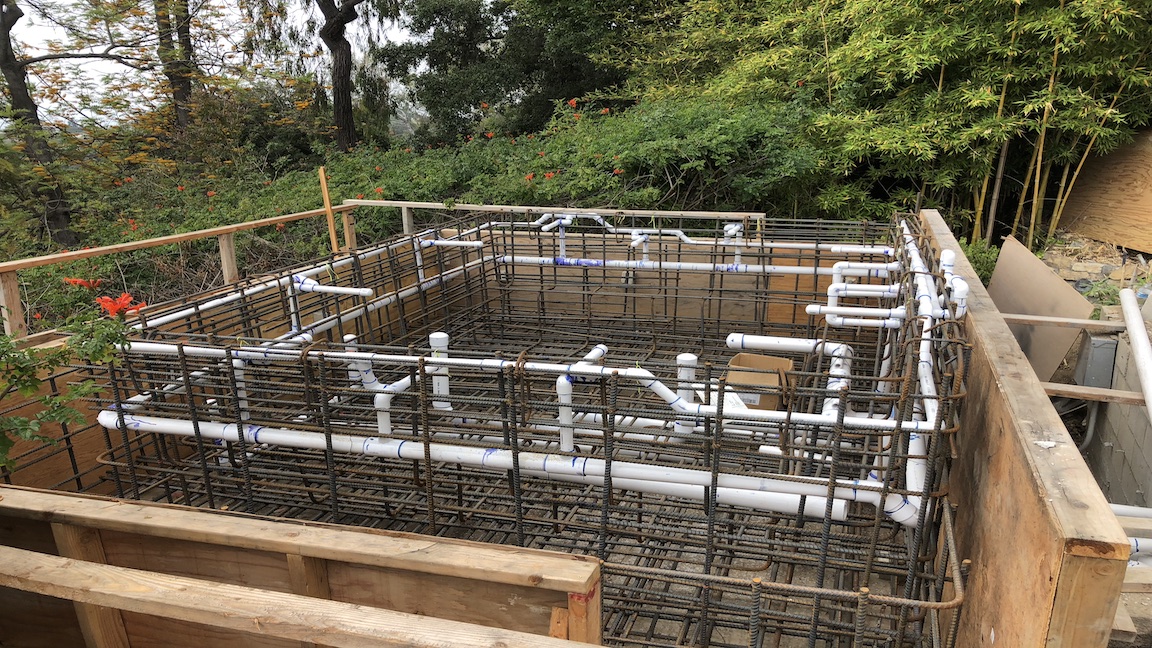When Luxury Pools Go Wrong: The Biggest Threats High-End Projects Face (And How to Avoid Them)
Building a luxury pool is a significant investment, one that should deliver both beauty and peace of mind. Yet, even the most impressive projects can...
4 min read
Leviticus Jelks
:
Updated on June 17, 2024
.jpg)
There’s more to pool water than just the way it looks. It’s also about how it feels. That all boils down to the type of pool sanitation system you’re using.
Usually, when we think of pools we focus on customized aesthetic features like the beautiful tile, unique shape, or sparkling plaster finish. Every detail of our new backyard oasis is planned and taken into careful consideration. Almost.
But what about the water? It’s the last step in the process, and we are so eager to dive right in. However, we often don’t think that the quality of the pool water can affect the way it feels on our skin.
In the realm of pool sanitation systems, there are two popular choices: saltwater and chlorine.
While chorine has been the top choice of sanitation systems for generations, saltwater pools have picked up in popularity over the years. With both systems having their benefits and drawbacks, it can be hard to decide which one could be better for your pool and your skin.
At J Designs Pool and Spa, we have 14 years of experience installing both saltwater and chlorine sanitation systems into our inground pools. We have seen how both can have positive effects on the health of our clients’ pools.
By the end of this article, you will know the similarities and differences between saltwater and chlorine pools, how each works, and break down each of their pros and cons.
At the end of the day, the final decision rests with you. We know that by having an honest discussion and comparison of saltwater pools and chlorine pools, you can make the decision for yourself which one is right for you.
Let’s get started!
Before we dive into the details of what makes saltwater and chlorine pools different, let’s talk about the one thing that they both have in common: chlorine.
A lot of people hear about saltwater pools and they automatically compare them to swimming in the ocean.
While having a crystal clear saltwater pool can give your backyard that luxurious beachy vibe, swimming in one is different from taking a few laps in the briny sea.
Even with saltwater pools, you need to balance your water with chemicals to make it healthy for your pool surface and skin.
The salt system that you build into your pool generates sodium from the pool salt (which is different and larger than table salt) and transforms it into sodium chloride. This is still another form of chlorine.
So even with a saltwater pool, you’re still utilizing chlorine, but at a smaller amount than a full chlorine pool.
Now you know the one similarity between saltwater and chlorine pools, but what sets them apart?
As we mentioned before, saltwater pools aren’t the same as swimming in seawater. However, that has not diminished their allure among homeowners, which has increased in the past 25 years.
Chlorine has become synonymous with the word “pool”, and that’s because both have walked hand-in-hand for a very long time.
Chlorine is a chemical compound that neutralizes bacteria and debris. In that process, it creates chloramines, which emit gas.
Unlike saltwater systems, chlorine is added to the pool manually or by using a chlorine feeder.
Both sanitation systems are viable options to choose for your inground pool water. Whichever you choose, either saltwater or chlorine, you want to take into consideration some vital aspects before making that important decision.
With chlorine, you will need to spend more time replacing it in your water, because it will dissolve fairly quickly. Unlike saltwater systems which use a lower level of chlorine and chemicals, requiring less attention.
While keeping a balanced level of chlorine in your pool will help avoid severe skin irritation, saltwater pools are more inclined to “soften” your water and be more gentle on your skin.
Saltwater systems are more complex than chlorine and can require more money when it comes to maintenance and repairs. This differs from the more traditional chlorinated pool systems, which are more accessible and wallet-friendly.
Now you know the difference between saltwater pools and chlorine pools, as well as their pros and cons and how each system works.
So which one should you choose?
It honestly comes down to what your individual needs are. With the information provided above, you now have the knowledge to confidently decide which sanitation system is best for you and your family.
Would you prefer the dependable and “old-school” chlorine pools, or more new-age saltwater? The choice is yours.
We at J Designs Pool and Spa have a 14-year history of providing our customers with both saltwater and chlorine systems. We give them the most up-to-date information regarding the pros and cons of each, and how either system will work with their pools.
If you are ready to speak with one of our team members further about saltwater or chlorine pools, contact us to schedule a consultation.
Still thinking about which sanitation system might be best for your pool and not ready to speak with us yet? No problem! Check out this related article for further information:
What's An Ozone Generator? And Why It's Great For Your Pool

Building a luxury pool is a significant investment, one that should deliver both beauty and peace of mind. Yet, even the most impressive projects can...

For more than twenty years, J Designs has partnered with discerning homeowners to create exceptional pools and luxury outdoor environments. Again and...

You wouldn’t power a modern luxury car with a 1980s engine. It might run, but not well. It would guzzle fuel, struggle under load, and eventually...